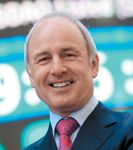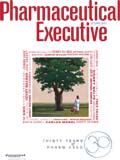Angus Russell: Bravura Performer
Pharmaceutical Executive
Angus Russell, CEO, Shire
As chief executive of a trim, mid-size pharma player with a distinctive portfolio franchise, Angus Russell has made his reputation as an iconoclast—the antagonist of bloat. "When I see a company organization chart that includes an 'Office of the CEO' my expectations about engagement with them drops precipitously," Russell says. "A big problem in this industry is how process trumps productivity."

Angus Russell
Shire is famous for coining the word "brave" as an expression of its mission to patients and society. Going forward, Russell says the touch point might well be "intimacy," in better understanding what the customer expects as part of any partnership and then removing internal barriers to making that happen.
As a result, strategic and operational flexibility is for Shire a key driver of competitive differentiation. In a business climate marked by enormous market churn, it pays to minimize the fixed commitments that bind and pursue opportunities where you find them. "We make investments in costly infrastructure only where it is necessary to prove our value to the customer." The model is to collaborate with others to lower these costs and maintain a free hand to move quickly when a new opportunity presents. As an example, Shire relied on a web of specialty stakeholders to create a tightly focused US sales force of only 18 people to launch Firazyr, the only orphan drug for adult hereditary angiodema that can be self-administered by the patient, whose estimated peak sales are expected to top $200 million.
Russell contends this frugal refusal to overextend encourages fresh thinking, particularly in avoiding the tendency for organizations to be guided by past decisions that entailed permanent, ongoing resource commitments. "I am less interested in presenting a blueprint for therapeutic leadership—one that rejects the purgatory of being anything less than first in class—than in creating something that provides a real solution for the customer. Today, it's all about the value argument."
This is also the rationale for Shire's diversified portfolio of niche segments such as ADHD, human genetic therapies, gastrointestinal drugs, and its recently created business called regenerative medicines. Says Russell, "Shire is in these areas precisely because we think we have established a clear value proposition that brings us beyond the existing standard of care. Value is no longer about proof of clinical superiority; it's not even about the underlying science. Rather, the key determinant of value lies in the question, 'Who is going to want to pay for it?' There is an emerging rule of thumb: If you want to set an NCE price at five times existing therapy, then your studies must demonstrate a direct payoff in patient outcomes that is five times higher as well."
Russell also believes in the notion that good management rests simply in rising to the occasion. When Russell joined Shire 12 years ago after a long stint in the diversified chemicals industry, he expected to serve out his time holding the position for which he was recruited: CFO. "I never thought I was groomed to take on the top post, as there is a clear difference between being on the operations side, where responsibilities tend to be self-evident, and the CEO role, which is unique to the person and cannot be relegated to a standard job description."
In his four years as CEO, Russell has defined four rules that structure his leadership style and performance: 1) above all else, set a good example by never demanding from others what you will not require of yourself; 2) cultivate human relations skills by establishing yourself as a personality, operating openly and circulating widely, and listening for feedback, while avoiding over-reliance on email and those graybeard intermediary staff; 3) focus on the pragmatic in recognizing what a single individual can actually achieve in a large organization, which means recruiting the best support cast of front-line management talent; and 4) leverage that pragmatism in crafting a vision and mission for the organization that every employee can understand.
Concludes Russell, "This is why our strategy plan for the period to 2020 still places a big emphasis on doing good for patients whose conditions present them with few treatment options. It's what the younger generation of managers want, and helping patients "be brave" gets people out of the cocoon of self-interest; it's a natural sifting process, in that people with spunk, spirit, and drive want to work for us." – William Looney

Addressing Disparities in Psoriasis Trials: Takeda's Strategies for Inclusivity in Clinical Research
April 14th 2025LaShell Robinson, Head of Global Feasibility and Trial Equity at Takeda, speaks about the company's strategies to engage patients in underrepresented populations in its phase III psoriasis trials.
Beyond the Prescription: Pharma's Role in Digital Health Conversations
April 1st 2025Join us for an insightful conversation with Jennifer Harakal, Head of Regulatory Affairs at Canopy Life Sciences, as we unpack the evolving intersection of social media and healthcare decisions. Discover how pharmaceutical companies can navigate regulatory challenges while meaningfully engaging with consumers in digital spaces. Jennifer shares expert strategies for responsible marketing, working with influencers, and creating educational content that bridges the gap between patients and healthcare providers. A must-listen for pharma marketers looking to build trust and compliance in today's social media landscape.
Pfizer Discontinues Development of Danuglipron for Chronic Weight Management
April 15th 2025Despite meeting key pharmacokinetic goals, a potential case of drug-induced liver injury led Pfizer to conclude that danuglipron’s risk-benefit profile did not support further development for chronic weight management.